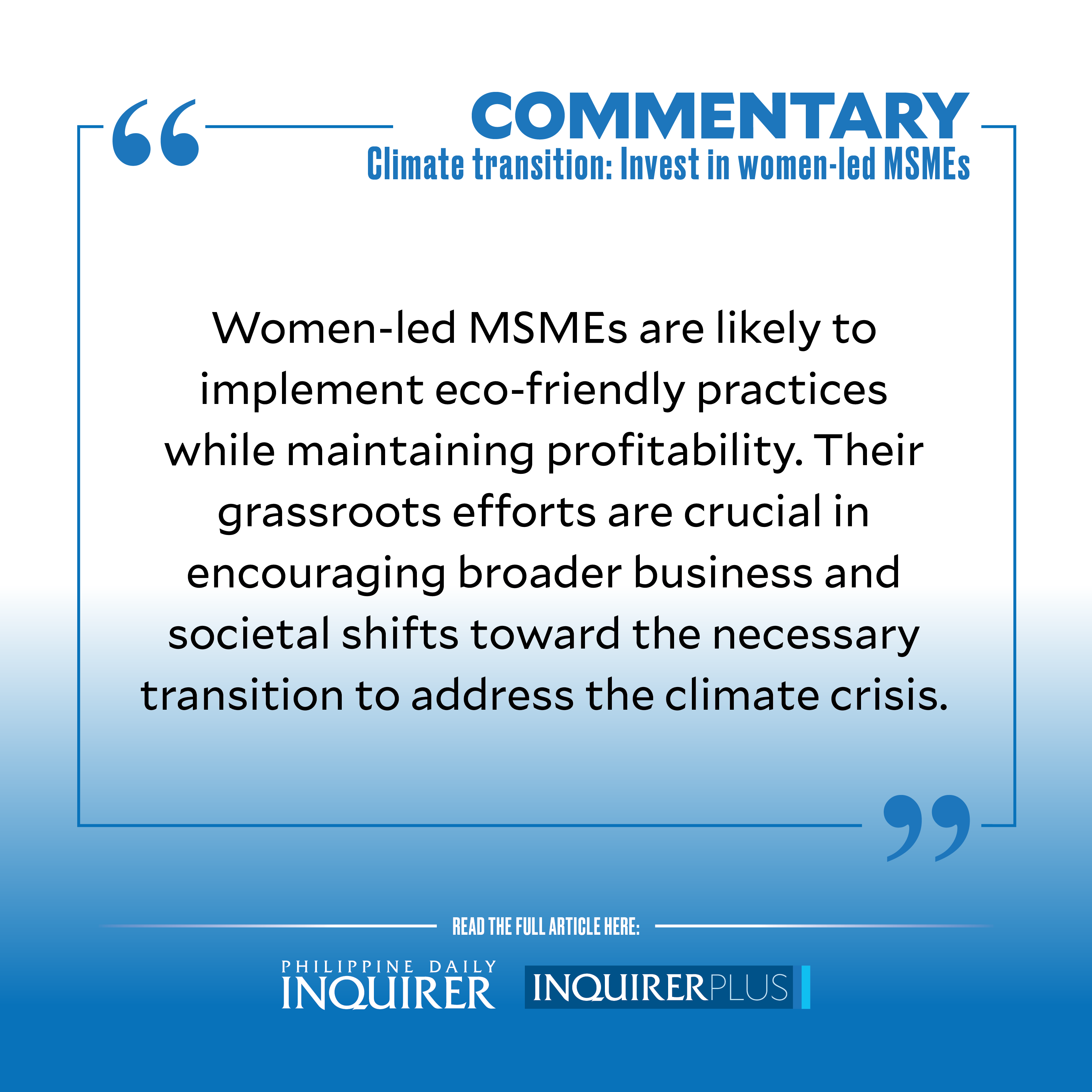Climate transition: Invest in women-led MSMEs

The United Nations has heralded the era of global boiling, as the world witnessed more extreme weather than ever before.
Here in Asia-Pacific, the threat posed by climate-fueled disasters is especially severe. Not only is Asia-Pacific the most disaster-prone region in the world, but it is also home to 75 percent of individuals who are exposed to natural disasters globally.
As climate disasters become more frequent and severe, it’s critical to safeguard the livelihoods of the most at risk, particularly women in the developing Asia-Pacific region.
Hindered by gender biases, a lot of women in these areas lag behind in health care, education, and economic opportunities. Extreme weather that disrupts paid work increases the burden on women to harvest and procure sufficient food for their families. This is worsened by the fact that women have lower savings to help tide them through financial emergencies.To avert the climate crisis and achieve net zero targets by 2050, developing economies need climate investments of $2 trillion annually by 2030—which represents a fivefold increase from current investment amounts, according to the International Monetary Fund. With just seven years left on the runway to 2030, investors need to be bold, purposeful, and intentional with their climate investments to catalyze maximum positive impact.
Micro, small, and medium enterprises (MSMEs) are the backbone of the Asia-Pacific region’s economy. In 2021, MSMEs accounted for an average of 97 percent of all enterprises and contributed more than 60 percent of the national labor force, contributing $15 trillion to Asia-Pacific’s gross domestic product.
In particular, women-led MSMEs constitute a significant portion of MSMEs in the Asia-Pacific region. In East Asia and the Pacific, women own 50 percent of all micro enterprises and 59 percent of small and medium-sized enterprises. Given how crucial women-led MSMEs are to Asian economic growth—there lies a prosperous opportunity to empower women business owners to better cope with the climate crisis and to support climate action goals.
Research from around the world has consistently proven that women leaders are more likely to support climate action compared to their male counterparts. A 2022 study by the European Investment Bank on female entrepreneurs in Europe found that women-led firms make more effort to curb emissions and have better results for environmental, social, and governance indicators.
Similarly, women-led MSMEs are likely to implement eco-friendly practices while maintaining profitability. Their grassroots efforts are crucial in encouraging broader business and societal shifts toward the necessary transition to address the climate crisis.
Despite a strong case for investing in women-led small businesses, they face major resource gaps. Women-led MSMEs lack critical knowledge of climate risks and access to adaptation funding, with systemic gender biases limiting their skill sets, knowledge base, and financial assets.
This creates a tough barrier to accessing necessary credit, as women are often less equipped to meet traditional collateral requirements for loans, leaving them underserved by financial institutions.
To bridge this gap, governments could provide research and development grants for climate adaptation innovations for women-led MSMEs, encouraging the use of emerging technologies. Additionally, financial institutions might adapt their collateral requirements, accepting nontraditional assets like insured inventory or jewelry, to improve financial access for women entrepreneurs.
Given the higher risks associated with such assets, it’s essential for governments to classify women-led MSMEs as a lending priority and to create policies that incentivize lenders to accommodate these risks. Supporting measures, including subsidies for approved climate adaptation technologies and tailored training programs, will further empower women-led MSMEs and enhance their chances of successful adaptation and growth.
The escalating climate crisis necessitates immediate funding for adaptation and mitigation. Women in the Asia-Pacific, already disadvantaged in resource allocation, are especially hard-hit by these challenges. However, they are also at the forefront of sustainable practices, positioning them as key players in climate response.
Leveraging the role of women-led MSMEs in initiating grassroots climate action can lead to wider benefits, such as inclusive growth and better gender parity. However, their impact is hindered by limited access to knowledge and financing.
It’s crucial that governments prioritize these enterprises in lending strategies and that financial institutions accommodate them by accepting alternative collateral, thereby unlocking the potential of this vital but overlooked group. The Jakarta Post/Asia News Network
—————-
Tristan Ace is chief product officer at AVPN.
—————-
The Philippine Daily Inquirer is a member of the Asia News Network, an alliance of 22 media titles in the region.
















